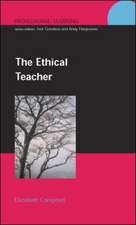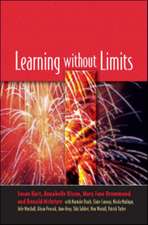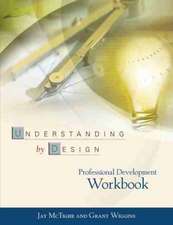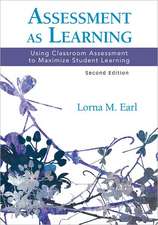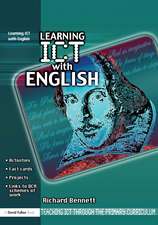Evaluating America’s Teachers: Mission Possible?
Autor W. James Pophamen Limba Engleză Paperback – 10 iun 2013
Preț: 226.60 lei
Nou
Puncte Express: 340
Preț estimativ în valută:
43.37€ • 45.11$ • 35.80£
43.37€ • 45.11$ • 35.80£
Carte tipărită la comandă
Livrare economică 14-28 aprilie
Preluare comenzi: 021 569.72.76
Specificații
ISBN-13: 9781452260853
ISBN-10: 1452260850
Pagini: 200
Dimensiuni: 152 x 229 x 15 mm
Greutate: 0.34 kg
Ediția:1
Editura: SAGE Publications
Colecția Corwin
Locul publicării:Thousand Oaks, United States
ISBN-10: 1452260850
Pagini: 200
Dimensiuni: 152 x 229 x 15 mm
Greutate: 0.34 kg
Ediția:1
Editura: SAGE Publications
Colecția Corwin
Locul publicării:Thousand Oaks, United States
Recenzii
"Jim
Popham
provides
a
step-by-step
analysis
of
the
do's
and
don't's
regarding
evaluation,
and
leaves
the
reader
with
hope
that,
done
properly,
teacher
evaluation
can
lead
to
better
instruction.Evaluating
America's
Teachersis
a
must
read
for
policy
makers,
district
and
school
administrators,
and
classroom
teachers
grappling
with
reviewing
and
improving
teacher
evaluation."
"Dr. Popham makes many true and important points in this book. Particularly noteworthy is his point that tests are not validated, inferences are. A measure that may well allow valid inferences about what a student knows may not necessarily be valid in making an inference about teacher effectiveness. I believe that many of those wishing to evaluate teacher effectiveness miss this important point."
"Through his delightful wit and insightful use of vocabulary, Jim Popham has crafted a must read book for education policy makers, school administrators, and teachers. Throughout the book there are many "pearls of wisdom" that help steer the teacher evaluation discussion in states and local school districts. As a chief state school officer who is currently working on implementing a statewide teacher evaluation system that is required to meet the Race to the Top and ESEA waiver requirements, this book provided me with the right questions to ask prior to completion of our work. I believe this book will enable readers to turn the subtitle—Mission Possible?—from a question into a reality."
"In the contentious environment where there are so many competing models for evaluating teacher quality (many of which are seriously flawed), it is refreshing (and essential) that strategies are considered that examine the full range of teacher quality (not just test scores on just reading an mathematics) to achieve a fair, valid, and comprehensive look at the quality of teachers. This book does just that and should be a "must read" for policymakers, administrators, and teachers."
"Popham's gift of writing and his wealth of knowledge and experience pour out of every page in this book. It recognises the inevitable—we will evaluate teachers—and shows how it can be done properly provided we remember that it is humans weighing the various sources of evidence that make judgements and not isolated instruments (observations, tests, ratings) that make these decisions. Hence, multiple methods, growth models, a clarity between formative and summative interpretations, and an emphasis on ensuring that the methods have instructional validity. The book glistens with goodness, it is sobering but optimistic, and it is fun to read."
"Teachers, administrators, and policy makers rejoice! Here is a single book, from a nationally recognized scholar, that makes sense of the issues involved with the evaluation of teachers."
"In an effective and diplomatic manner, Popham suggests concrete ways that policy makers, along with local school leaders and teachers, can make sure our students are protected from summative teacher evaluation systems that do more harm than good. No one should make policy at any level or strive to build a defensible teacher evaluation system without studying this book."
"Jim Popham has taken on one of the most contentious issues in American education today, and he presents an objective, fact-based approach to creating new systems to evaluate teacher effectiveness that are both fair to teachers and helpful in improving instruction."
"Popham is softly critical of ineffective practice and common misperceptions but strongly proactive in his belief that this can be done—we can create teacher evaluation systems that are fair and have a positive impact on student learning. I truly feel after readingEvaluating America's Teachers: Mission Possiblethat this task is not only, in Popham's words a "mission possible," but it is a mission critical for America's schools."
"As America's educational policymakers wrestle with revamping teacher evaluation systems, decisions are likely to be made that will have real and significant consequences in classrooms—the stakes are high. Every school board member in the country needs a solidly-researched, clearly articulated guide to understanding what works and what could go wrong. Dr. Popham'sEvaluating America's Teachersis that guide."
"InEvaluating America's Teachers, Jim Popham brings clarity to the critically important and divisive issue of teacher evaluation. Drawing on a deep reservoir of technical knowledge in assessment and evaluation, Dr. Popham uniquely combines expertise, perspective, and wisdom to present an authentic path forward for policymakers, administrators, and teachers to address the evaluation of teachers in ways that honor the work they do with children in classrooms. If we commit to the disciplined thought and action called for in this eminently readable book, America's teachers and children will thrive."
"Evaluating America’s Teachersby James Popham is an enlightening description of methods utilized to evaluate teachers, with strengths and weaknesses described for each method. Federal mandates have positioned teachers on the receiving end of evaluations that are poorly understood in terms of reliability, validity, and bias. This book provides insight on teacher evaluation not only for teachers, but administrators and policy makers as well. It informs readers of the essentials involved in teacher evaluation."
"Once again Jim Popham has brought insight and clarity to a complex topic that only a person of his stature and expertise could provide."
"I believe the book will be a very good resource to educators. This book focuses on the hottest topic in the field of education right now and the author clearly has a great deal of experience with the subject. In addition, his use of humor makes the book an enjoyable read."
"This book hits squarely on a topic for which district and state policy makers need current information. It is too bad this book was not out during the roll out of teacher evaluations in states everywhere. I am sure the author's wisdom could have certainly helped in selecting tests that effectively measure teacher effectiveness."
"I could see using this text in a book study with my administrative team as we discuss how we can ensure effectiveness in our assessments of classroom performance. His explanation of what to look at for evidentiary source makes more sense than anything the state put out, but in the end, the state will dictate a good part of what will be used in the evaluation."
"I seeEvaluating America's Teachers: Mission Possible?as a direct attempt to address this controversial issue head on. In this book the author addresses the need for teacher accountability and addresses the hurdles and pitfalls which are often encountered in states and school districts attempts to develop a comprehensive and all encompassing fair teacher evaluation process."
"I find the book to be an interesting and effective guide to help a state or school district purse a teacher evaluation process that can measure the true progress of a teacher's competence and value."
"I like many of his proposals about the format of a quality teacher evaluation system. As a New York state high school principal, I feel our state is working to put many of these recommendations into practice."
"It is an incredible discussion of the problem. VERY in-depth and comprehensive. It really is one of the best summaries of testing I have ever read, and it makes an incredible case for improving the teacher evaluation dilemma"
"As states ramp up their teacher evaluation efforts, it is becoming more and more important that this is done in a way that benefits, rather than harms, students. In this important and well-argued book, Jim Popham explains why teacher evaluation absolutely has to be based on a "weighted evidence" approach, and shows what policy-makers, administrators, and teachers need to do to make this work. Everyone interested in the quality of education in the United States should read this book."
"Dr. Popham makes many true and important points in this book. Particularly noteworthy is his point that tests are not validated, inferences are. A measure that may well allow valid inferences about what a student knows may not necessarily be valid in making an inference about teacher effectiveness. I believe that many of those wishing to evaluate teacher effectiveness miss this important point."
"Through his delightful wit and insightful use of vocabulary, Jim Popham has crafted a must read book for education policy makers, school administrators, and teachers. Throughout the book there are many "pearls of wisdom" that help steer the teacher evaluation discussion in states and local school districts. As a chief state school officer who is currently working on implementing a statewide teacher evaluation system that is required to meet the Race to the Top and ESEA waiver requirements, this book provided me with the right questions to ask prior to completion of our work. I believe this book will enable readers to turn the subtitle—Mission Possible?—from a question into a reality."
"In the contentious environment where there are so many competing models for evaluating teacher quality (many of which are seriously flawed), it is refreshing (and essential) that strategies are considered that examine the full range of teacher quality (not just test scores on just reading an mathematics) to achieve a fair, valid, and comprehensive look at the quality of teachers. This book does just that and should be a "must read" for policymakers, administrators, and teachers."
"Popham's gift of writing and his wealth of knowledge and experience pour out of every page in this book. It recognises the inevitable—we will evaluate teachers—and shows how it can be done properly provided we remember that it is humans weighing the various sources of evidence that make judgements and not isolated instruments (observations, tests, ratings) that make these decisions. Hence, multiple methods, growth models, a clarity between formative and summative interpretations, and an emphasis on ensuring that the methods have instructional validity. The book glistens with goodness, it is sobering but optimistic, and it is fun to read."
"Teachers, administrators, and policy makers rejoice! Here is a single book, from a nationally recognized scholar, that makes sense of the issues involved with the evaluation of teachers."
"In an effective and diplomatic manner, Popham suggests concrete ways that policy makers, along with local school leaders and teachers, can make sure our students are protected from summative teacher evaluation systems that do more harm than good. No one should make policy at any level or strive to build a defensible teacher evaluation system without studying this book."
"Jim Popham has taken on one of the most contentious issues in American education today, and he presents an objective, fact-based approach to creating new systems to evaluate teacher effectiveness that are both fair to teachers and helpful in improving instruction."
"Popham is softly critical of ineffective practice and common misperceptions but strongly proactive in his belief that this can be done—we can create teacher evaluation systems that are fair and have a positive impact on student learning. I truly feel after readingEvaluating America's Teachers: Mission Possiblethat this task is not only, in Popham's words a "mission possible," but it is a mission critical for America's schools."
"As America's educational policymakers wrestle with revamping teacher evaluation systems, decisions are likely to be made that will have real and significant consequences in classrooms—the stakes are high. Every school board member in the country needs a solidly-researched, clearly articulated guide to understanding what works and what could go wrong. Dr. Popham'sEvaluating America's Teachersis that guide."
"InEvaluating America's Teachers, Jim Popham brings clarity to the critically important and divisive issue of teacher evaluation. Drawing on a deep reservoir of technical knowledge in assessment and evaluation, Dr. Popham uniquely combines expertise, perspective, and wisdom to present an authentic path forward for policymakers, administrators, and teachers to address the evaluation of teachers in ways that honor the work they do with children in classrooms. If we commit to the disciplined thought and action called for in this eminently readable book, America's teachers and children will thrive."
"Evaluating America’s Teachersby James Popham is an enlightening description of methods utilized to evaluate teachers, with strengths and weaknesses described for each method. Federal mandates have positioned teachers on the receiving end of evaluations that are poorly understood in terms of reliability, validity, and bias. This book provides insight on teacher evaluation not only for teachers, but administrators and policy makers as well. It informs readers of the essentials involved in teacher evaluation."
"Once again Jim Popham has brought insight and clarity to a complex topic that only a person of his stature and expertise could provide."
"I believe the book will be a very good resource to educators. This book focuses on the hottest topic in the field of education right now and the author clearly has a great deal of experience with the subject. In addition, his use of humor makes the book an enjoyable read."
"This book hits squarely on a topic for which district and state policy makers need current information. It is too bad this book was not out during the roll out of teacher evaluations in states everywhere. I am sure the author's wisdom could have certainly helped in selecting tests that effectively measure teacher effectiveness."
"I could see using this text in a book study with my administrative team as we discuss how we can ensure effectiveness in our assessments of classroom performance. His explanation of what to look at for evidentiary source makes more sense than anything the state put out, but in the end, the state will dictate a good part of what will be used in the evaluation."
"I seeEvaluating America's Teachers: Mission Possible?as a direct attempt to address this controversial issue head on. In this book the author addresses the need for teacher accountability and addresses the hurdles and pitfalls which are often encountered in states and school districts attempts to develop a comprehensive and all encompassing fair teacher evaluation process."
"I find the book to be an interesting and effective guide to help a state or school district purse a teacher evaluation process that can measure the true progress of a teacher's competence and value."
"I like many of his proposals about the format of a quality teacher evaluation system. As a New York state high school principal, I feel our state is working to put many of these recommendations into practice."
"It is an incredible discussion of the problem. VERY in-depth and comprehensive. It really is one of the best summaries of testing I have ever read, and it makes an incredible case for improving the teacher evaluation dilemma"
"As states ramp up their teacher evaluation efforts, it is becoming more and more important that this is done in a way that benefits, rather than harms, students. In this important and well-argued book, Jim Popham explains why teacher evaluation absolutely has to be based on a "weighted evidence" approach, and shows what policy-makers, administrators, and teachers need to do to make this work. Everyone interested in the quality of education in the United States should read this book."
Cuprins
Preface
Acknowledgments
1. What Underlies the Tightening of Today's Teacher-Evaluation Programs?
What Uncle Sam Wants
A Federal Vision of Teacher Evaluation
What Could Go Wrong?
Chapter Implications for Three Audiences
2. Human Judgment: Needed or Not?
Human Judgment's Role
Evaluation Basics
What about the Evaluation of Teachers?
Judgment-Requisite Choices
Chapter Implications for Three Audiences
3. Defensible Teacher Evaluation
The Wonders of Whereas
Why Use a Weighted-Evidence Judgmental Approach to Teacher Evaluation?
A Weighted-Evidence Judgment Evaluative Survey
Who Are the Judges?
Chapter Implications for Three Audiences
4. Evidence from Standardized Tests
Key Testing Tenets
Why We Test
A Psychometric Blessed Trinity
Standardized Test- Two Tribes, Two Tasks
Traditional Test-Building and Its Off-Task Allure
The Origins of Traditional Educational Testing
Dealing with Effective Instruction
Ensuring Score-Spread from the Get-Go
Instructional Sensitivity as a Requisite
Returning to Validity
Evidential-Weight Guidelines
Chapter Implications for Three Audiences
5. Evidence from Classroom Assessments
Staking Out the Nature of "Classroom Assessment"
A Quest for Evidence of Student Growth
Formative and Summative Applications
Enhancing the Quality of Classroom-Assessment Evidence
Evidence of a Teacher's Instructional Ability
What's Assessed
The Traditional Psychometric Triplets
Following Test Development, Improvement, and Scoring Rules
Have Teachers Played it Straight?
Evidential-Weight Guidelines
Chapter Implications for Three Audiences
6. Evidence from Classroom Observations
What's Distinctive about Classroom Observations?
Observations Versus Ratings
Playing the Odds: Observation of Instructional Means
An Observational Reality: The Mysterious Middle Group
Getting the Most Evaluative Mileage Out of Classroom Observation Evidence
Two Widely-Used Observation Procedures
Danielson's Framework for Teaching
The Marzano Model
Evidential-Weight Guidelines
Chapter Implications for Three Audiences
7. Evidence from Ratings
Rooting Around with Ratings
Lurking Comparisons
Amalgam Judgments
Three Flavors of Bias
Administrators' Ratings
Students' Ratings
Making Ratings Righteous
The Rating Form
Rater Preparation
The Old and the New
Evidential-Weight Guidelines
Chapter Implications for Three Audiences
8. Evidence from Sundry Sources
Alternative Sources of Evidence for Evaluating Teachers
Academic Achievements
Changes in Students' Affect
Lesson Plans
Opportunity-to-Learn Student Surveys
Parental Engagement
Parent Ratings
Professional Development
Ratings by Colleagues
Student Interviews
Teacher-Made Tests
Teachers' Self-Ratings
Augmentation or Obfuscation?
Evidential-Weight Guidelines
Chapter Implications for Three Audiences
9. Mission Possible?
Weighted-Evidence Judgment of Teachers: A Reprise
What To Do- And How?
Chapter Imlpications for Three Audiences
Responding to a Subtitle
Index
Acknowledgments
1. What Underlies the Tightening of Today's Teacher-Evaluation Programs?
What Uncle Sam Wants
A Federal Vision of Teacher Evaluation
What Could Go Wrong?
Chapter Implications for Three Audiences
2. Human Judgment: Needed or Not?
Human Judgment's Role
Evaluation Basics
What about the Evaluation of Teachers?
Judgment-Requisite Choices
Chapter Implications for Three Audiences
3. Defensible Teacher Evaluation
The Wonders of Whereas
Why Use a Weighted-Evidence Judgmental Approach to Teacher Evaluation?
A Weighted-Evidence Judgment Evaluative Survey
Who Are the Judges?
Chapter Implications for Three Audiences
4. Evidence from Standardized Tests
Key Testing Tenets
Why We Test
A Psychometric Blessed Trinity
Standardized Test- Two Tribes, Two Tasks
Traditional Test-Building and Its Off-Task Allure
The Origins of Traditional Educational Testing
Dealing with Effective Instruction
Ensuring Score-Spread from the Get-Go
Instructional Sensitivity as a Requisite
Returning to Validity
Evidential-Weight Guidelines
Chapter Implications for Three Audiences
5. Evidence from Classroom Assessments
Staking Out the Nature of "Classroom Assessment"
A Quest for Evidence of Student Growth
Formative and Summative Applications
Enhancing the Quality of Classroom-Assessment Evidence
Evidence of a Teacher's Instructional Ability
What's Assessed
The Traditional Psychometric Triplets
Following Test Development, Improvement, and Scoring Rules
Have Teachers Played it Straight?
Evidential-Weight Guidelines
Chapter Implications for Three Audiences
6. Evidence from Classroom Observations
What's Distinctive about Classroom Observations?
Observations Versus Ratings
Playing the Odds: Observation of Instructional Means
An Observational Reality: The Mysterious Middle Group
Getting the Most Evaluative Mileage Out of Classroom Observation Evidence
Two Widely-Used Observation Procedures
Danielson's Framework for Teaching
The Marzano Model
Evidential-Weight Guidelines
Chapter Implications for Three Audiences
7. Evidence from Ratings
Rooting Around with Ratings
Lurking Comparisons
Amalgam Judgments
Three Flavors of Bias
Administrators' Ratings
Students' Ratings
Making Ratings Righteous
The Rating Form
Rater Preparation
The Old and the New
Evidential-Weight Guidelines
Chapter Implications for Three Audiences
8. Evidence from Sundry Sources
Alternative Sources of Evidence for Evaluating Teachers
Academic Achievements
Changes in Students' Affect
Lesson Plans
Opportunity-to-Learn Student Surveys
Parental Engagement
Parent Ratings
Professional Development
Ratings by Colleagues
Student Interviews
Teacher-Made Tests
Teachers' Self-Ratings
Augmentation or Obfuscation?
Evidential-Weight Guidelines
Chapter Implications for Three Audiences
9. Mission Possible?
Weighted-Evidence Judgment of Teachers: A Reprise
What To Do- And How?
Chapter Imlpications for Three Audiences
Responding to a Subtitle
Index
Notă biografică
Descriere
Education
measurement
and
evaluation
expert
W.
James
Popham
critiques
what
is
wrong
with
many
existing
teacher-evaluation
systems
and
offers
an
alternate
system
that
respects
the
professionalism
and
dignity
of
teachers.


